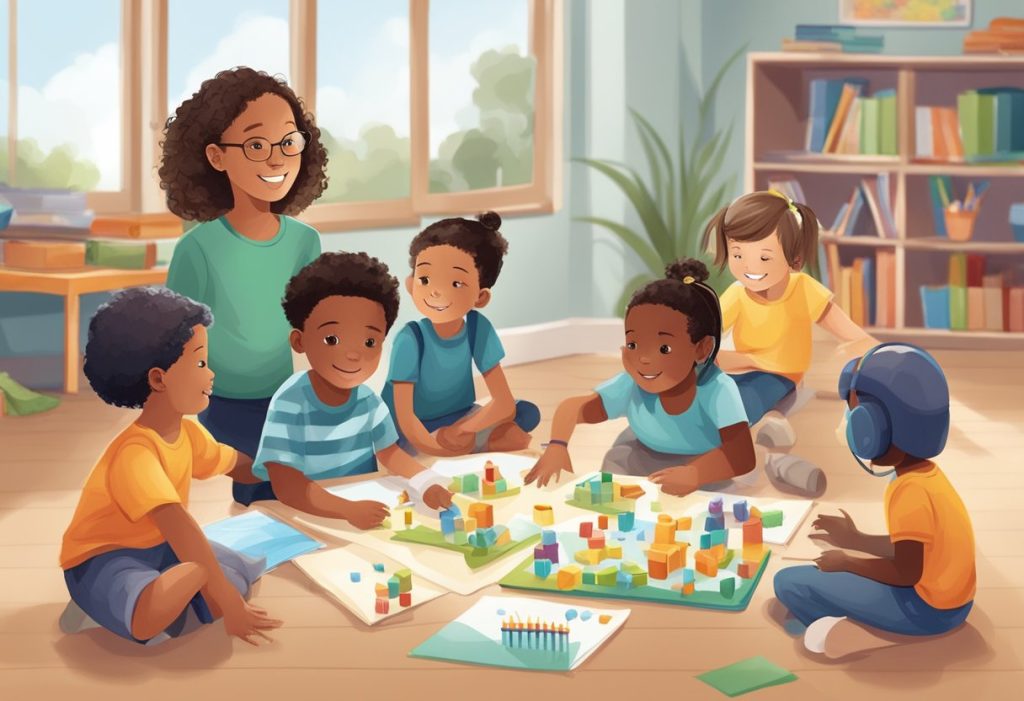When we talk about children with mental retardation we speak of particular young persons who differ in their angles of view, abilities and difficulties. The term itself is clinical and feels distant but behind the label are real kids who laugh, cry, learn, and grow; just like any other children. Often society looks more at what they cannot do than what they can thereby leading to prejudice and misunderstanding. These children need us to look beyond the present circumstances, because they are potential achievers and future leaders that demand recognition for all their inherent qualities.

We have come to understand that being aware is the first step towards making a difference. Breaking down stereotypes that labels create requires us educating ourselves and our communities. It involves knowing what intellectual disability is as well as vowing for the strength these young individuals bring into your lives which also involve certain differences. If we embrace every child’s identity fully then maybe we will be surprised by how much they can achieve.
It takes everyone-parents, teachers, classmates and communities-to combat stigma related to Intellectual Disability (ID). We should establish a welcoming environment while speaking against discrimination through words or actions. This entails helping such children find their way by giving them similar chances that every other child would want: learn, prosper and succeed.
Understanding Intellectual Disability

Our perception defines everything they experience in life. That’s why it’s important to know that an intellectually disabled child has his or her own potential.
Defining Intellectual Disability
Significant limitations both in intellectual functioning (reasoning ability) and adaptive behavior (everyday social skills) indicate an intellectual disability among people suffering from it; this condition appears before 18 years old age limit. Developmental delay is a term frequently used when development milestones are not achieved by children under five years of age; these lags should warn parents about possible IQ deficiency in their babies later on.
- Intellectual Functioning: This includes learning, reasoning and problem solving abilities typical of human beings in general.
- Adaptive Behaviour includes three basic skill areas such as:
- Conceptual skills: language, literacy, money, time, and number concepts, and self-direction.
- Social Skills: empathy, social judgment, interpersonal communication skills; the capacity to make and keep friends are among them.
- Practical Skills: activities of daily living (personal care), occupational skills, healthcare, travel/navigation, schedules/routines, safety issues and use of money.
Children with Down syndrome or cerebral palsy for example may experience intellectual limitations as well as adaptive behaviour difficulties.
Common Misconceptions and Stereotypes
Many misconceptions surround children with intellectual disabilities. For instance one of the biggest misperceptions is that all people who have an intellectual disability look like each other or behave alike. There are certain physical characteristics that kids with Down’s syndrome might have but each child has their own abilities and traits.
- Misconception: Children With Intellectual Disabilities Cannot Learn New Skills
- Reality: They can learn new things throughout their lives with proper supports
- Misconception: Autism means a person has an intellectual disability.
- Reality: Autistic people have different abilities; some do not even have an intellectual impairment while others still have it.
Diagnosis and Early Development
This knowledge will be helpful to prompt early intervention through diagnosis hence influencing a child’s development path tremendously.
- Testing/assessment: Health practitioners use different diagnostic instruments that measure both adaptive behavior and intelligence quotient (IQ).
- Observation : It’s necessary to observe a child at different locations so as to see his/her strengths and weaknesses.
Interdisciplinary care often benefits children who have special needs. Interdisciplinary care may involve the following:
- Teachers
- Pediatricians
- Occupational Therapists
- Psychologists
- Speech Pathologists
These professionals work as a team to support a child’s development and mental health, thus enhancing their well-being and potential for growth and learning in future.
Community and Social Integration
Within this exploration of the lives of children with intellectual disabilities, we understand that they should participate in community life. Yet, they are kept out by different barriers. They also have the right to feel included and belong just like any other child.
The predicament of social integration
There are several barriers to social inclusion faced by intellectually disabled children within our community. Perpetuation of these stereotypes leads to discrimination which makes it hard for these kids to join in community activities. It is our responsibility to establish such stereotypes with an aim of ensuring that everyone can contribute or benefit from community life.
- Stereotype: Pre-conceived ideas limiting kids’ participation.
- Discrimination: Unfair treatment they may encounter in public places.
- Belonging: A sense of being accepted that can be difficult to achieve.
Facilitating Community Inclusion
We can actively help foster inclusive communities for children with intellectual disabilities. This includes organizing inclusive events as well as opening up dialogues within the society to make it more tolerant and understanding. Teaching social skills is essential because it helps them interact comfortably with their colleagues at school.
- Inclusive Events Planning: Festivities and get-togethers embracing all members
- Building Social Skills: Programs and interventions designed for assisting children acquiring necessary social abilities
- Developing Positive Identities within Society
Empowering children towards building positive identities within society forms part of our journey goes on around here. It encompasses going beyond societal constraints inherent in a simple socio-model towards examining various ways that diverse capabilities could be allowed and integrated into every aspect of existence so as each child’s unique contribution is celebrated. We create an environment that includes every student in a community that values them.
- Identity: The individual self of any child in the society
- Inclusive Environment: A surrounding that appreciates differences
- Social Model: A view focusing on environmental and social obstacles to inclusion
Education and Work Pathways
We acknowledge the importance of providing education and employment pathways for children with intellectual disabilities. This focuses on creating opportunities for inclusion and accessibility thus enabling each person to fully develop their potential in learning as well as working environments.
Inclusive Education: The Australian Approach
Australia advocates for inclusive education which refers to educating children with intellectual disabilities together with other students. Through this, mutual respect is developed within the students hence understanding among them. Several key strategies are observed:
- Individualized Education Plans (IEP): Programs are adjusted according to needs so that learners can participate and achieve within classrooms.
- Accessible Resources: From braille textbooks to assistive technology, it is crucial that all materials be made accessible.
Moving from Schooling into Employment
The transition from school to work is a crucial stage in any young person’s life. Career development forms an integral part of what we do:
- Work Placements: These enable pupils to gain practical experience.
- Job Coaching Services: Mentoring and coaching by professionals who help young people develop work skills and find career paths available for them.
Work That Is Full of Meaning
It is the right of every person to pursue employment that involves meaningful contributions. At work, this means:
- Work Environments that Can Be Adapted: In line with our commitment.
- Diverse Job Possibilities: We wish to ensure that there are different jobs available that meet various skills and interests for individuals with intellectual disabilities.
We are shaping a more open society where everyone can succeed by promoting inclusive education, ensuring smooth transitions from school to work, and fostering workplaces that value all contributions.
Advocacy and Empowerment
Navigate with intellectual disability in children where we realize the importance of advocating for their rights and empowering them to take control of their lives. It means that every child is equipped with necessary tools and support to enable self-determination and autonomy.
Self-Advocacy and Independence
This is because whenever we teach these kids how to advocate for themselves, they have so much potential in them which can be unleashed. The most important thing is to create an environment that makes it possible for them to express what they want or need without any fear of intimidation. Some of the ways include:
- Education: Offering learning opportunities that focus on understanding their entitlements as well as speaking up for oneself.
- Leadership opportunities: Encouraging participation in groups and activities that promote leadership traits and decision making.
By enabling these children towards independence, it will be a milestone leading them into fulfilling lives full of confidence while navigating through the society safely.
Family and Community Support
No one survives alone, a fact especially applicable in the case of intellectually challenged young people. In our societies’ intimacy is a crucial element in supporting this vulnerable group’s needs, while facilitating their growth process at the same time. Participation includes:
- Inclusive activities: This enhances inclusive communities by organizing community events that are friendly to all children even those who have disparities.
- Resource sharing: Creating avenues for families to share information, services and support with each other.
With collective effort we can develop a compassionate community where every person matters fostering justice as well as equality in all spheres of life.
Legal Frameworks and Disability Rights
Children with intellectual disabilities require legal safeguards from infringement in order to protect their interests; therefore , legal protections must be put in place . Therefore, we are committed towards being informed about key legislations relating to disability rights . These actions include:
- Advocating for change: Engage legislators in discussions aimed at enhancing the legislation around disability rights through campaigns.
- Educational workshops: Organize sessions on disability laws, what it means for our children and how we can get it right.
Being proactive and well-informed about legal frameworks surrounding this issue will enable us to protect the rights of these individuals, ensuring that justice leans more in their favor.

